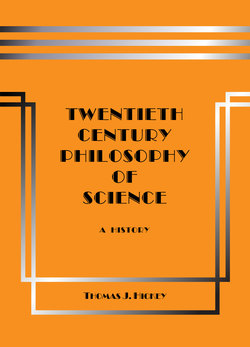Читать книгу Twentieth-Century Philosophy of Science: A History (Third Edition) - Thomas J. Hickey - Страница 65
На сайте Литреса книга снята с продажи.
3.34 An Interpretation Issue
ОглавлениеThere is ambiguity in the literature as to what a state description represents and how the discovery system’s processes are to be interpreted. The phrase “artificial intelligence” has been used in both interpretations but with slightly different meanings.
On the linguistic analysis interpretation, which is the view taken herein, the state description represents the language state for a language community constituting a single scientific profession defined by a test design. Like the diverse members of a profession, the system produces a diversity of new theories. No psychological claims are made about intuitive thinking processes. Computational philosophy of science so interpreted is a technique for a specialized type of linguistic analysis employing mechanized generative grammars.
The computer discovery systems are generative grammars that generate and test theories. The system inputs and outputs are both object-language state descriptions. The instructional code of the computer system is in the metalinguistic perspective, and exhibits diachronic dynamic procedures for theory development. As such the linguistic analysis interpretation is neither a separate philosophy of science nor a psychologistic agenda. It is compatible with the contemporary pragmatism and its use of generative grammars makes it closely related to computational linguistics.
On the cognitive-psychology interpretation the state description represents the scientist’s cognitive state consisting of mental representations and the discovery system represents the scientist’s cognitive processes. The originator of the cognitive-psychology interpretation is Herbert Simon. In his Scientific Discovery: Computational Explorations of the Creative Processes and other works Simon writes that he seeks to investigate the psychology of discovery processes, and to provide an empirically tested theory of the information-processing mechanisms that are implicated in that process.
He states that an empirical test of the systems as psychological theories of human discovery processes would involve presenting the computer programs and some human subjects with identical problems, and then comparing their behaviors. But Simon admits that his book provides nothing by way of comparison with human performance. And in discussions of particular applications involving particular historic discoveries, he also admits that in some cases the historical scientists actually performed their discoveries differently than the way that the systems performed the rediscoveries.
Similarly in their “Processes and Constraints in Explanatory Scientific Discovery” in Proceedings of the Thirteenth Annual Meeting of the Cognitive Science Society. (2008) Langley and Bridewell, who advocate cognitive psychology, appear to depart from the cognitive psychology interpretation. They state that they have not aimed to “mimic” the detailed behavior of human researchers, but that instead their systems address the same tasks as scientists and carry out search through similar problem spaces. This much might also be said of the linguistic-analysis approach.
The academic philosopher Paul Thagard, who follows Simon’s interpretation, originated the name “computational philosophy of science” in 1988 in his book Computational Philosophy of Science. Hickey admits that it is more descriptive than the name “metascience” that Hickey had proposed in his Introduction to Metascience: An Information Science Approach to Methodology of Scientific Research in 1976. Thagard defines computational philosophy of science as “normative cognitive psychology”. The cognitive-psychology systems have successfully replicated developmental episodes in history of science, but the relation of their system designs to systematically observed human cognitive processes is still unexamined. And their outputted theories to date have not yet contributed to the current state of any science.
The phrase “computational philosophy of science” does not commit one to either interpretation. Which interpretation prevails in academia will likely depend on which academic department productively takes up the movement. If the psychologists develop new and useful systems, the psychologistic interpretation will prevail. If the philosophers take it up successfully, their linguistic-analysis interpretation will prevail.
Readers wishing to know more about Simon, Langley and Thagard, and about discovery systems and computational philosophy of science are referred to BOOK VIII below.
